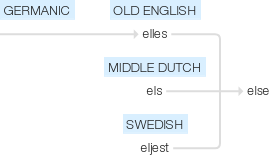Else
Old English elles, of Germanic origin; related to Middle Dutch els and Swedish eljest .
wiktionary
From Middle English ells, elles, from Old English elles(“other, otherwise, different”), from Proto-West Germanic *alljas, from Proto-Germanic *aljas(“of another, of something else”), genitive of *aljaz(“other”), from Proto-Indo-European *h₂élyos, from *h₂el-(“other”).
Cognate with Old Frisian elles(“other”), Old High German elles, ellies(“other”), Danish eller(“or”), Danish ellers(“otherwise”), Swedish eljes, eljest(“or else, otherwise”), Norwegian elles(“else, otherwise”), Gothic 𐌰𐌻𐌾𐌹𐍃( aljis, “other”), Latin alius(“other, another”), Ancient Greek ἄλλος(állos), Arcadocypriot αἶλος(aîlos), modern Greek αλλιώς(alliós, “otherwise, else”).
etymonline
else (adv.)
Old English elles "in another manner, other, otherwise, besides, different," from Proto-Germanic *aljaz (source also of Gothic aljis "other," Old High German eli-lenti, Old English el-lende, both meaning "in a foreign land;" see also Alsace), an adverbial genitive of the neuter of PIE root *al- "beyond" (source also of Greek allos "other," Latin alius). As a quasi-adjective, synonymous with other, from 1660s; the nuances of usage are often arbitrary.
Productive of a number of handy compounds that somehow never got traction or have been suffered to fall from use: elsehow (1660s) "somehow or other;" elsewards (adv.), 1882, "somewhere else;" Old English elsewhat (pron.) "something else, anything else;" elsewhen (adv.), early 15c., "at another time; elsewhence (c. 1600); elsewho (1540s). Among the survivors are elsewhere, elsewise. Menacing or else, with omitted but implied threat, is implied by 1814:
In Tynedale, Buccleuch seized upon no less than thirty-six English freebooters, and put them to death without mercy. The wrath of Elizabeth waxed uncontrollable. "I marvel," are her own royal expressions, "how the king thinks me so base-minded as to sit down with such dishonourable treatment. Let him know we will be satisfied, or else"—Some of James's ancestors would have bid her
"Choke in thy threat. We can say or as loud."
[Sir Walter Scott, "The Border Antiquities of England and Scotland," 1814]
